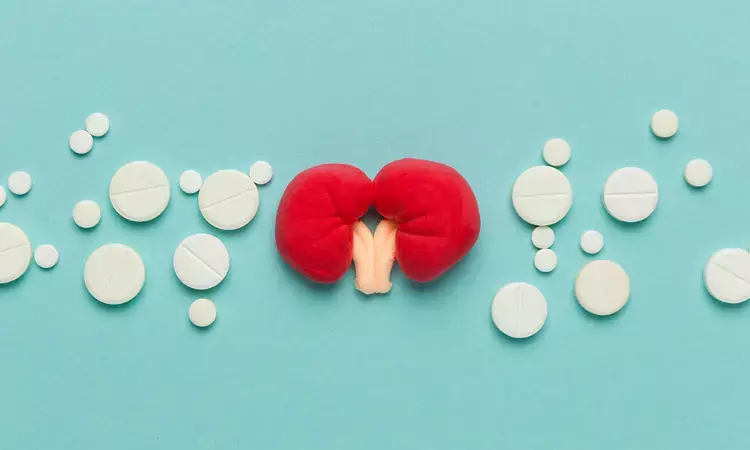- Home
- Medical news & Guidelines
- Anesthesiology
- Cardiology and CTVS
- Critical Care
- Dentistry
- Dermatology
- Diabetes and Endocrinology
- ENT
- Gastroenterology
- Medicine
- Nephrology
- Neurology
- Obstretics-Gynaecology
- Oncology
- Ophthalmology
- Orthopaedics
- Pediatrics-Neonatology
- Psychiatry
- Pulmonology
- Radiology
- Surgery
- Urology
- Laboratory Medicine
- Diet
- Nursing
- Paramedical
- Physiotherapy
- Health news
- Fact Check
- Bone Health Fact Check
- Brain Health Fact Check
- Cancer Related Fact Check
- Child Care Fact Check
- Dental and oral health fact check
- Diabetes and metabolic health fact check
- Diet and Nutrition Fact Check
- Eye and ENT Care Fact Check
- Fitness fact check
- Gut health fact check
- Heart health fact check
- Kidney health fact check
- Medical education fact check
- Men's health fact check
- Respiratory fact check
- Skin and hair care fact check
- Vaccine and Immunization fact check
- Women's health fact check
- AYUSH
- State News
- Andaman and Nicobar Islands
- Andhra Pradesh
- Arunachal Pradesh
- Assam
- Bihar
- Chandigarh
- Chattisgarh
- Dadra and Nagar Haveli
- Daman and Diu
- Delhi
- Goa
- Gujarat
- Haryana
- Himachal Pradesh
- Jammu & Kashmir
- Jharkhand
- Karnataka
- Kerala
- Ladakh
- Lakshadweep
- Madhya Pradesh
- Maharashtra
- Manipur
- Meghalaya
- Mizoram
- Nagaland
- Odisha
- Puducherry
- Punjab
- Rajasthan
- Sikkim
- Tamil Nadu
- Telangana
- Tripura
- Uttar Pradesh
- Uttrakhand
- West Bengal
- Medical Education
- Industry
NSAIDs Increase Risk of AKI & hyperkalemia in Diabetes Patients: Study

Non-steroidal anti-inflammatory drugs (NSAIDs) are one of the most commonly prescribed medication. The gastrointestinal tract and kidneys are important targets of clinical events associated with the use of NSAIDs. A study presented at the American Society of Nephrology's Kidney Week 2020 suggests that NSAIDs may increase the short-term risk for acute kidney injury (AKI) and hyperkalemia in patients with diabetes mellitus.
Individuals with diabetes mellitus (DM) may be susceptible to NSAID –induced acute kidney injury (AKI). However, data on their risk of NSAID-related adverse renal events is sparse. Therefore, the researchers of Singapore, conducted a study to evaluate the risk and factors for acute kidney injury and/or hyperkalemia after NSAID prescription to individuals with DM.
It was a retrospective cohort study of 3896 individuals with DM who received prescriptions between 1st July 2015 and 30th December 2017 from the largest tertiary hospital and a major public primary care institution in Singapore. Individuals prescribed systemic NSAID >14 days were identified as the "NSAID" group. Among 3896 patients, the researchers categorized 138 in the NSAID group and 3758 in the non-NSAID group. They retrieved laboratory, hospitalization and medication data from 6 months before until 30 days after the first prescription from electronic medical records. The major outcome assessed was the incidence of AKI (serum creatinine increased >50%) and/or hyperkalemia (serum potassium >5.5 mmol/L) within 30 days after prescription.
Key findings of the study were:
- Upon analysis, the researchers noted that the primary outcome of AKI and/or hyperkalemia within 30 days developed in 525 (13.5%).
- Using the adjusted model, they found that the presence of cardiovascular disease (adjusted OR 1.41), RAASi use (aOR 1.42), diuretic use (aOR 1.91), and elevated potassium at baseline (aOR 1.36) were independent predictors for the outcome.
- They also found that NSAID prescription for >14 days was associated with a higher 30-day risk of AKI and/or hyperkalemia (adjusted OR 1.62).
- They further noted that the risk of AKI and/or hyperkalemia was markedly increased if NSAID was prescribed concurrently with a RAAS blocker (adjusted OR 4.17) or a diuretic (adjusted OR 3.31).
The authors concluded, "NSAID prescription in individuals with DM may be associated with higher 30-day risk of AKI and/or hyperkalemia, especially with concurrent RAAS blocker or diuretic."
For further information:
Dr Kartikeya Kohli is an Internal Medicine Consultant at Sitaram Bhartia Hospital in Delhi with super speciality training in Nephrology. He has worked with various eminent hospitals like Indraprastha Apollo Hospital, Sir Gangaram Hospital. He holds an MBBS from Kasturba Medical College Manipal, DNB Internal Medicine, Post Graduate Diploma in Clinical Research and Business Development, Fellow DNB Nephrology, MRCP and ECFMG Certification. He has been closely associated with India Medical Association South Delhi Branch and Delhi Medical Association and has been organising continuing medical education programs on their behalf from time to time. Further he has been contributing medical articles for their newsletters as well. He is also associated with electronic media and TV for conduction and presentation of health programs. He has been associated with Medical Dialogues for last 3 years and contributing articles on regular basis.
Dr Kamal Kant Kohli-MBBS, DTCD- a chest specialist with more than 30 years of practice and a flair for writing clinical articles, Dr Kamal Kant Kohli joined Medical Dialogues as a Chief Editor of Medical News. Besides writing articles, as an editor, he proofreads and verifies all the medical content published on Medical Dialogues including those coming from journals, studies,medical conferences,guidelines etc. Email: drkohli@medicaldialogues.in. Contact no. 011-43720751


